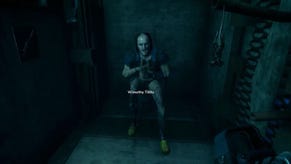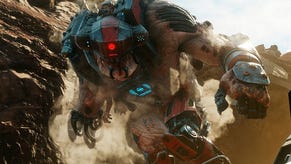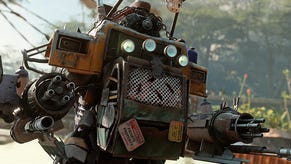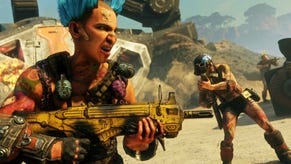RAGE against the machine: Tim Willits on id's latest
Nathan Grayson talks to RAGE creative director Tim Willits about helming the first new IP in years from the shooter genre's grandaddy, id Software.
RAGE is kind of a big deal. As id's first in-house developed title since Doom 3, it's got years' worth of blood, sweat, and tears (and maybe a hint of residual urine, given Doom 3's propensity for sheer terror) riding on it. On top of that, it's a new IP charging into an absurdly crowded FPS genre guns-a-blazing – a tactic which has recently left many developers riddled with holes and on the wrong end of the chopping block.
And all the while, it's trying desperately to avoid being another heaping helping of id Software comfort food. Vehicular combat? In! On-foot deathmatch? Out. While at QuakeCon, we watched closely, too: no evil curly mustaches in sight. This isn't secretly a devious plot by Bizarro id.
By all rights, then, creative director Tim Willits should be sweating bullets. But he's not. When we spoke with him, he exuded an almost infectious confidence. Honestly, he seemed downright giddy. And why not? He's about to see the fruits of years of hard labor. His game's about to take a crowded genre by storm. His company's going to succeed where so many others have failed. In that respect, it's all about perspective.
So we asked, and Willits was more than happy to answer. Read on for his thoughts about a RAGE sequel, PC gaming's current modding scene, expectations of what an FPS should be, crunch time, and tons more.
VG247: John Carmack recently mentioned interest in “heading in the direction of” a RAGE sequel. And though he's one of the few people in the world I might believe if he said he actually knows everything, he's not you guys. So, what's the RAGE team's perspective on a sequel?
Tim Willits: My hope is that it does really well and we can do a sequel. That's my hope. But again, we just need to get this game done. We're on the ten-yard line, and we've got our hand on the ball. We can see the endzone.
You know, our goal from the very beginning was to make a franchise that stood by itself. So please Lord make it good [laughs]. If it's successful, that's definitely something we'll consider. But, as a studio in general, we need to get the next Doom game done. So that's our focus.
But, you know, I have confidence that RAGE will be awesome. I have confidence that – someday down the road – we'll do another one. But no one's working on it. We just need to get this one done.
RAGE is keeping mod tools in the picture, but other games have sort of taken to sweeping them under the rug lately. And then there's Diablo III, which is expressly forbidding mods of any sort. Obviously, that makes it a lot harder for cheaters to gum up the works (not to mention Blizzard's new auction house), but is this the beginning of a disturbing trend?
It's always a tricky situation. Cheating is a big problem. Trust me: if everyone was honest, we wouldn't have locks on our doors. For us – you know, I can't talk to what they're doing and their philosophy – modding has always been very important. Heck, I got started at id modding. So make no mistake: it's very important to me.
But, as games get more advanced, it becomes much more difficult. I mean, with RAGE, you'll be able to download the SDK and id Studio, but I'll be surprised if someone makes an entire new map. They may work with the layer system, [but not a whole map].
But I know for us, if mod-makers could wreck the game for everyone else, I know that we at id would have a serious conversation about whether or not we would allow modding. Unfortunately, sometimes for the greater good, you do have to kind of tighten in what players can do with the game.
Modding is very important to us, but the mod community in general is not as big as it used to be. That's just the way it is. It's unfortunate, but tools have gotten more advanced and are much more complex. It takes much more horsepower – especially with RAGE. If you were to bake a RAGE map at home, it'd take a long time.
What's the status on the second RAGE iOS game? I've heard that it has cars and might exist maybe.
That's more of a John [Carmack] thing. You know, with the first iOS game, we did exactly what we wanted to do: make something cool and get the RAGE name out there. About a year before you ship a game, you want to get the whole PR machine going. So for us, it was a good stepping stone. But yeah, the second game. I don't know when that'll be done.
Here we are after months of demoing and years of explanations, but I still constantly find comments like “Oh, it's just a Fallout rip-off” or “It's Borderlands, but with more brown.” And these are from core gamers who are supposedly “informed.” Is the pervasiveness of that erroneous perception disheartening for you?
"If you play RAGE for two hours, you'll get it and you'll like it."
I'll be brutally honest with you: I haven't played one second of Borderlands. But I can see Gearbox from my office. They're only about five miles away.
You know, people always want to look at something and then relate it back to something else. Which is fair. I don't think it's a fair comparison, but I can see why people do that. So that's why we're giving these two hour demos. What I've always said is that, if you play RAGE for two hours, you'll get it and you'll like it. That's my mantra.
So that's why we did the Europe tour and mainstream press. Now we're doing online guys at QuakeCon. Really, we need you guys – the journalists – to say “I played it, and this is what I felt it was like.” I mean, people know I'm going to say good things about my game. I'm going to say it's the greatest thing ever, because that's my job. You guys have to play it. That's why we're doing this.
Most game developers don't just give you two hours with a game, though. So that speaks to my confidence in the title, and so far, responses have been very positive.
Thanks to some none-too-pleasant business over at Team Bondi, the online gaming hivemind's been chattering away about crunch time. Seeing as RAGE is hurtling toward the finish line, I imagine you – especially – are quite familiar with crunch. You could even be called a Captain of sorts. Anyway, what's id's policy toward crunch time? How do you guys handle it?
In any industry, people have to work extra hard to finish projects. But in videogames, you all work together to finish up. When you have a large group of people complaining about something, they make more noise than a single person. But yes, some type of crunch mode is the reality of it.
For RAGE, we were completely honest. And I'm not saying those [Team Bondi] guys weren't, but I try to be straightforward with the guys – say, “These are our milestones.” And at id, we let people say how long something is going to take.
So it's like “Hey, Joe Developer. You have to finish this map. How long is it going to take you?” And if he says, “It'll take me a month,” then I expect it to be done in month. And if it's not done in a month, then you need to come in on weekends and finish it. If it's going to take six weeks, then do it in six weeks. But don't tell me you need a month and then take six weeks.
"If you have food for everybody, crunch time is not so bad. They're like 'Oooo, got some food!'"
So we try to let people be accountable for their own schedule. And we try to be as open with everyone [as possible]. We say, “These are the dates that are important. This is pre-cert. These are our candidates. We have to hit these dates.”
And we of course have food for everybody. Man, if you have food for everybody, crunch time is not so bad. They're like “Oooo, got some food!” [Laughs.] If you put food in someone's belly, it makes their mind very happy.
And then we're all professionals. Everyone gets paid well. We reward people that put in extra effort. [Crunch] is getting better in the industry in general. But you always have to crunch to finish projects. Other industries are the same way. When guys were building the new Boeing plant, I can tell you there was some crunching going on. When they're finishing movies, there's some crunching going on. It's just the nature of the beast. But we try to mitigate it with good schedules, personal accountability, and feeding people [laughs]. That's very important.
RAGE is entering an FPS genre so competitive that it makes Doom 3's old haunt look like a Hug Convention. That sort of environment breeds a lot of expectations, and the FPS sphere's no different. “You must have multiplayer. You can't be too linear. You can't be too non-linear.” Etc. How does id approach that issue? How much do expectations affect your development process?
Well, established rules. Since we established the original FPS rules, I don't really mind too much if we break them. That's the big thing people get upset about with our multiplayer. They're like “What the hell are you doing? You invented on-foot deathmatch. I can't believe you're making RAGE without it!”
But they need to slow down. We want RAGE to be able to stand on its own – not follow the same cookie-cutter formula. And we have other franchises that... well, it doesn't take a genius to figure out what our other franchises are going to do.
So it's OK to break tradition, to break rules – especially if you created the tradition. And people immediately get uneasy if it feels [different]. They're comfortable with the last game they played. So if the next game has a lot of similar rules, they're like “Oh, I feel comfortable with this.” But if you give them something that's different, there's unease at first.
But if the game is good – if the game is compelling and rewarding – they'll embrace it. They really will. And first-person shooters these days are really following a trend – which RAGE does not follow. I think it's good, because I believe there's some modern shooter franchise fatigue. And people want something that's a little bit different.
This hasn't been a good year for new IP. It's frightening, because you watch how much the industry's changing, and you see developers dropping right and left. A new IP, then, is a coin toss where you lose money unless the damn thing lands on its side. How much pressure is that putting on id? What makes you so confident that you can succeed where so many others have failed?
"The big thing is that we're id."
The big thing is that we're id. If we say something, we have the pedigree for people to pay attention. So that really helps us. And then it really goes back to getting guys like you in there playing the game. We did a ton of videos. We did a “Making of.” We've done all the tours. We did the iPhone thing. Education has been very important for us. We feel that we've got good traction.
But it is an uphill battle. It really is. And when publishers make these million-million-million dollar bets, they want to make sure their investments pay off. But I think we've got good feet on the ground for this.











